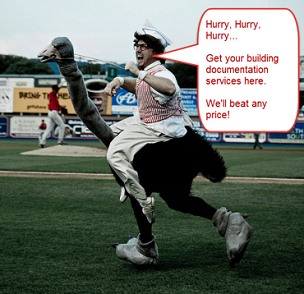I have a lot of friends and colleagues in the industry who, like me, provide building documentation services. When we speak to one another, we often talk about how busy (or slow) we are, what type of work we are doing and, sometimes, we share stories of our frustrations.
One of the more common frustrations I’ve noticed comes after losing a bid. “We just got the results back from a bid we submitted. They said our number was two times higher than the other bidder! Two times! That’s just ridiculous. We had a real tight number.” Sound familiar? I’ve been both the listener and the storyteller in this discussion.
We rationalize such losses by noting how poorly written the competing RFP or spec was, or how the client didn’t really consider qualifications like they said they would — how all that mattered was the cost. After all, had the competing RFP or spec been written properly, the bids would have been closer.
And we think that maybe, just maybe, someone “bought” the job by underbidding it so he could pump up his resume. You know, one of those guys who just got a scanner and have no real experience or expertise. Or worse, maybe it was someone who offshores the modeling. How can you compete with that?
This leaves me wondering if building documentation services have reached the point that they are just another commodity service like janitorial services, car washes, auto repair, etc. Wikipedia describes a commodity this way:
…a class of goods for which there is demand, but which is supplied without qualitative differentiation across a market. A commodity has full or partial fungibility; that is, the market treats its instances as equivalent or nearly so with no regard to who produced them.
So, has the market for building documentation services decided that it doesn’t matter who produces them? I’d say yes and no.
You will always encounter a client who only cares about the cost. I like to refer to this type of client as an “ostrich.” They don’t really understand or care to learn how the different methods of documentation can return vastly different results. Nor do they want to acknowledge that someone who has been performing these services for decades is more qualified than someone who just decided to become a provider. Instead they prefer to stick their head in the sand and ignore the risks as long as they get the lowest price.
However, I’ve been on just enough jobs where I’ve played clean-up for a client after they decided to go with a low bid on a poorly written spec. Once a client has had the misfortune of contracting an individual or a firm who isn’t truly qualified to be offering building documentation services, they will think twice about doing it again. This misfortune serves as a reminder that the services we offer are not commodities, but are truly professional services that require someone to have a high degree of knowledge and experience to perform them properly.
Yes, this industry needs more education on how to differentiate the various service offerings, but it also needs be wary of the warning signs. Let’s face it, if bid results come back with a two hundred percent difference then maybe, just maybe, the bids or bidders are not truly being compared as apples-to-apples. You can always find someone willing to do it cheaper. This is just a gentle reminder that sometimes you get what you pay for.






